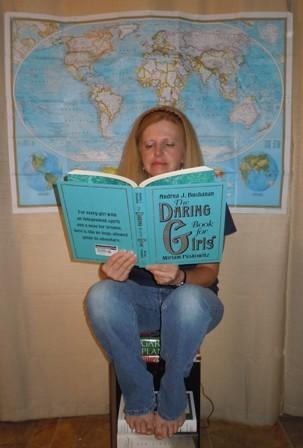Cheryl Hughes: Uncertainty
Earlier this week, my daughter said, “I’m so worried, what will people do?”
“They will do what they’ve always done, “I said, “They will find a way.”
I didn’t know it at the time, but my Grandma Stone—my father’s mother—was one of the most important people in my life. I didn’t see her often, but when I did, she told me stories of how things had been, what she thought about it, and how she moved forward.
My grandmother lived through the Great Depression and World War II, as well as influenza, cholera, polio, and meningitis epidemics. Before her own death, she buried three daughters—Helen, at the age of 17, was lost to Tuberculosis. Helen was born on December 7, 1941, the day Japan attacked Pearl Harbor. “I thought it was the end of the world,” Grandma told me, “But it wasn’t.”
Grandma had to depend on family to help her—the family of the husband who had abandoned her and five children at the height of the Depression. She lived into her nineties, I believe, because she just didn’t know how to quit.
I read once, fear isn’t an entity just floating around in the ether, waiting to pounce on you, but rather, fear is something you grab and pull into you. When my daughter and I were talking about the current climate of fear in our society, she said, “People have lost their minds.”
Many of us feel that way. Sometimes, fear pervades people when their current situation is beyond their immediate experience, and even beyond the experience of those around them. At times, I have been so resentful of the difficult circumstances in which I grew up. I’ve decided I need to stop being resentful, because recently, those circumstances have served me well. Those hard times are the reason I am not in the throes of fear. I am uncertain, but I am not fearful. I have a personal and family history of difficulty and survival to fall back on.
Last week, my friend, Roger Southerland, and I were discussing epidemics. He told me about the meningitis outbreak in Morgantown at the end of the 1800s. He directed me to a website that documents such events. The meningitis outbreak of 1899 is documented in “The Louisville Journal of Surgery and Medicine.” The entry is provided by Dr. E.A. Cherry. He and his colleague, Dr. J.H. Austin, treated the patients during the epidemic in Morgantown.
Dr. Cherry logged information on the symptoms, treatment, and subsequent deaths of thirteen patients in Morgantown. They symptoms included chills, fever, extreme headache, vomiting, delirium, coma, and almost certain death (chroniclingamerica.loc.gov. America’s historic newspapers from 1789 – 1963). It is bone-chilling to read. I mention this period in our history, because I want to encourage you to look around. Morgantown is still here. There are descendants from those times still here.
Last Wednesday, I was with my granddaughter as she was doing her school assignments online. Lauren Tarshis read two chapters of her book, I SURVIVED THE SINKING OF THE TITANTIC, to the students watching. At the close of her reading, she addressed her audience and told them that her books were able to exist because of interviews with people who had told their stories. “Remember,” she said, “One day, people will want to talk to you about what it was like to live through this uncertain time.”
On CBS Sunday Morning, Lee Cowen reminded us of how our world had changed overnight. He encouraged us to be mindful of how these times of isolation might just have brought us closer together. “The world has not ended, “he said, “We might just be getting a brand new start.”



























